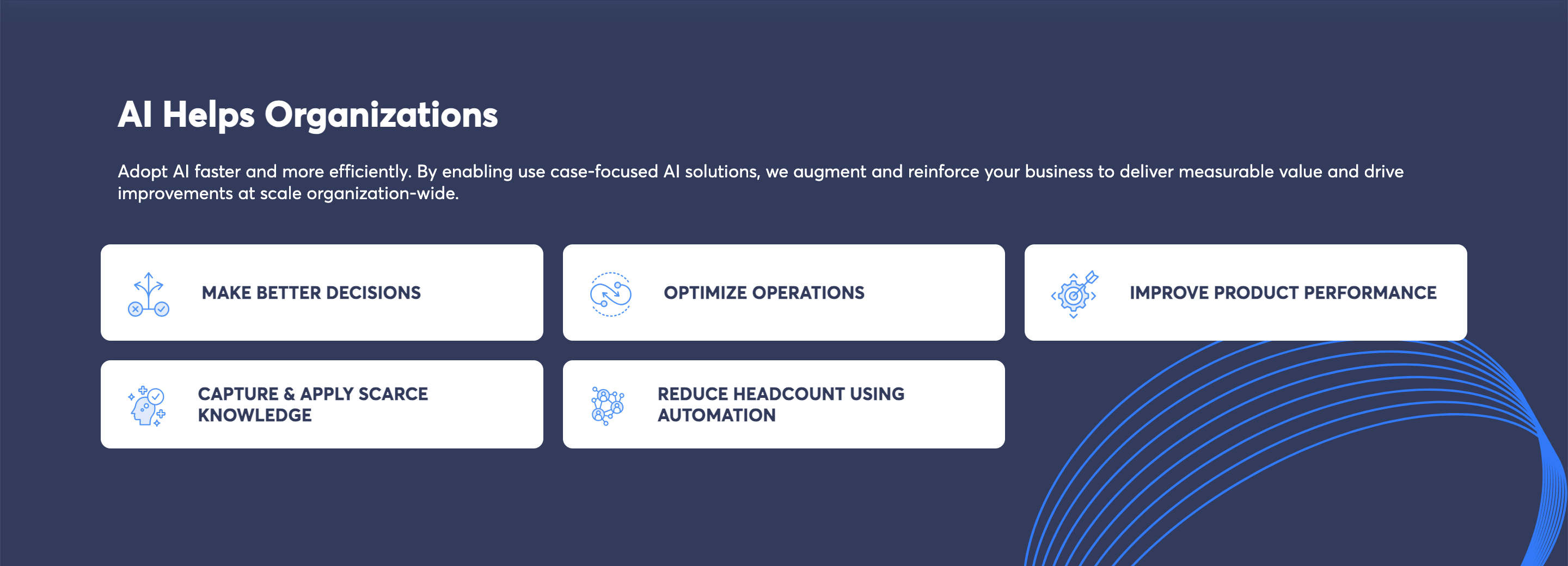“GenAI is revolutionizing the world,” “GenAI is transforming the industry,” “GenAI is changing the landscape.” These statements are not just buzzwords; they reflect both the excitement around and the truth of the impact GenAI has on various sectors. When you understand the future challenges for the technology, GenAI proves to be highly effective in enhancements, analysis, text generation, coding, and data handling. These solutions do not require development from scratch, can be scaled quickly within an organization, and are flexible enough to function across multiple use-cases simultaneously.
If you work in the technology service industry or for a portfolio company, such as a Private Equity Firm, this guide is for you. It explores how to unlock additional value for your clients with GenAI and how to position it effectively in front of partners.
Who Would Benefit from Gen AI?
GenAI has the potential to open new business models for some, assist with operations for others, and serve as a differentiator among competitors. The challenge lies in determining which company will discover GenAI as an undiscovered diamond and which can do without it.
Healthcare: The application of GenAI in healthcare goes beyond patient notes and drug discovery; it’s reshaping personalized medicine and operational efficiencies. Imagine a future where AI algorithms predict health issues before they manifest, using data from wearable devices. This predictive capability can revolutionize preventive medicine and significantly reduce healthcare costs. Companies like DeepMind have made strides in applying AI to predict acute kidney injury (AKI) earlier than traditional methods.
Advertising and Marketing: In the realm of advertising and marketing, GenAI’s ability to generate creative content is just the beginning. The real game-changer is its capacity for hyper-personalization at scale. By analyzing customer data, GenAI can craft marketing messages tailored to the individual preferences and behaviors of each customer, transforming the customer experience from generic to genuinely personal. This level of personalization can dramatically increase conversion rates and customer loyalty.
Manufacturing: The potential for GenAI in manufacturing extends to creating more sustainable practices. By optimizing design and production processes, GenAI can significantly reduce waste and improve energy efficiency. For example, BMW uses AI to optimize paint shop processes, reducing waste and energy consumption. Similarly, GenAI can enhance supply chain resilience, enabling companies to predict disruptions and adapt more swiftly.
Educational Services: GenAI is set to democratize education by providing personalized learning experiences that were previously unattainable. GenAI-powered chatbots can offer round-the-clock tutoring, adapting their responses to each student’s unique needs and learning pace. This technology not only augments the role of human educators by assisting in lesson preparation and query resolution but also promises to significantly enhance student engagement and understanding. Educational institutions and companies that leverage GenAI to curate and deliver content will gain a significant competitive advantage, potentially transforming the educational landscape.
Customer Service: The call center industry, notorious for high turnover and the need for intensive training, is undergoing a radical transformation thanks to GenAI. By equipping customer service representatives with GenAI assistants, companies are streamlining the onboarding process and significantly improving service quality. These AI assistants can quickly scan and synthesize policy documents and historical interactions to provide accurate, helpful responses. Moreover, the advent of sophisticated customer-facing chatbots, powered by GenAI, offers a user experience that rivals human interaction, potentially redefining customer service standards.
Tax, Legal, and Finance: In domains characterized by complex, unstructured data, such as HR, tax, legal, and finance, GenAI’s capacity to summarize, analyze, and provide access to information is particularly valuable. For example, GenAI can transform raw data from spreadsheets into comprehensible, plain-language reports or draft initial versions of legal documents and tax filings. This capability streamlines operations, reduces the burden on professionals, and accelerates the delivery of services, heralding a new era of efficiency and effectiveness in these sectors.
Software Development: The influence of GenAI on software development is profound and extensive, touching every phase of the development lifecycle. From automating the drafting of personas and user stories to generating and debugging code, GenAI tools like GitHub Copilot are making software development faster, more efficient, and less reliant on offshoring. This technology not only facilitates easier collaboration and documentation but also enhances the quality of code produced, marking a significant shift in how software is developed and maintained.
As you can see, the list is quite extensive and only grows over time. Here are just some basic examples.

Preparing for GenAI Solutions
Aligning GenAI initiatives with strategic business objectives is critical. We propose to begin by conducting workshops and training sessions for both your team and your clients to foster an understanding of GenAI’s potential and its practical applications. Highlight successful case studies within their industry to illustrate tangible benefits.
Collaborate closely with your clients throughout the GenAI implementation process. Co-creation workshops can help in identifying specific business challenges that GenAI can solve, designing bespoke solutions that integrate seamlessly with existing processes and systems.
As GenAI becomes more integral to business operations, addressing ethical considerations and building trust is paramount. Transparently discuss the ethical use of data, the potential for bias in AI models, and the importance of explainability in GenAI solutions. Establishing clear guidelines and principles around these issues can help mitigate concerns and foster a positive perception of GenAI technologies.
A single GenAI model can be used for many purposes across a company. Make sure the company is prepared:
- Cloud-Based Infrastructure: The company’s data needs to be centralized and accessible in the cloud for GenAI to work effectively.
- Secure IT Environment: Data security is crucial, so the company needs strong IT safeguards.
- Data Governance: Clear rules and procedures are needed to manage data access and use.
- Digital Skills and Culture: Employees need to be comfortable with digital tools and open to learning new ways of working.
Some companies in your portfolio might not be ready for GenAI right away. Their IT infrastructure, staffing, and overall strategy might not be set up for it to be a quick win. But that doesn’t mean GenAI can’t be valuable in the future. Here’s what to consider:
- Focus on Knowledge Work: Even without advanced digital maturity, companies can benefit from GenAI in areas like finance, marketing, HR, legal, and tax. These functions rely heavily on analyzing information and completing tasks that GenAI excels at.
- Start with Simpler Digital Tools: Before diving into GenAI, consider if there are simpler digital solutions that can deliver value first. Maybe migrating data to a cloud-based system and implementing basic analytics could unlock significant improvements. These steps can pave the way for GenAI later.
Challenges and Considerations
Despite the promising applications of GenAI, organizations are approaching its implementation with caution, mindful of the risks related to data privacy, protection, and the potential for bias. The importance of human oversight in leveraging GenAI technologies cannot be overstated, as it ensures the integrity of data and the accuracy of outcomes. Firms are developing governance protocols and ethical compliance frameworks to manage the use of GenAI effectively, ensuring that experimentation within divisions is harnessed and institutionalized to mitigate risks and maximize rewards.
Integrating GenAI Strategically for Long-term Success
Instead of concluding, let’s summarize what to do in a situation where the time for GenAI is right, but a honed process is not yet in place.
First and foremost, identifying the tangible benefits GenAI can offer is crucial. Firms must undertake a thorough analysis to understand how GenAI can enhance scalability, operational efficiency, and competitive advantage in their specific contexts and the industries they target. This involves evaluating their current digital infrastructure and readiness to adapt to technological innovations.
To bring these strategies to life, building a robust team is indispensable. This includes not only hiring AI specialists to ensure the firm’s systems are secure and cutting-edge but also assembling a dynamic group dedicated to experimenting with GenAI applications. Through brainstorming and trial, this team should focus on developing quick-to-implement, scalable ideas that can revolutionize operations across the portfolio.
Partnerships extend the capability horizon. Collaborating with leading tech companies and academic institutions can provide access to the latest GenAI tools and insights, enabling firms to stay at the forefront of AI advancements. This synergy is vital for nurturing a culture of continuous learning and adaptation, ensuring firms are always aligned with the most current and effective strategies.
Once you’ve identified the best way to use GenAI, put it into action! Help employees adjust to the changes and leverage this technology to create more value across your entire organization. Starting on a smaller scale allows for manageable experimentation and learning, with the flexibility to scale up successful initiatives. This iterative process encourages a culture of innovation, where constant learning and adaptation to the evolving AI landscape are embedded in the firm’s ethos.
By adopting a strategic approach that encompasses rigorous planning, team building, partnerships, and ethical considerations, you can leverage GenAI to uncover new opportunities, enhance operational efficiencies, and secure a competitive edge. This holistic integration strategy is the cornerstone of achieving long-term success and staying ahead in the rapidly evolving digital landscape.
Don’t let your business fall behind—embrace the future today and unlock a world of possibilities with GenAI. Contact us to build and implement you Gen AI solution.





